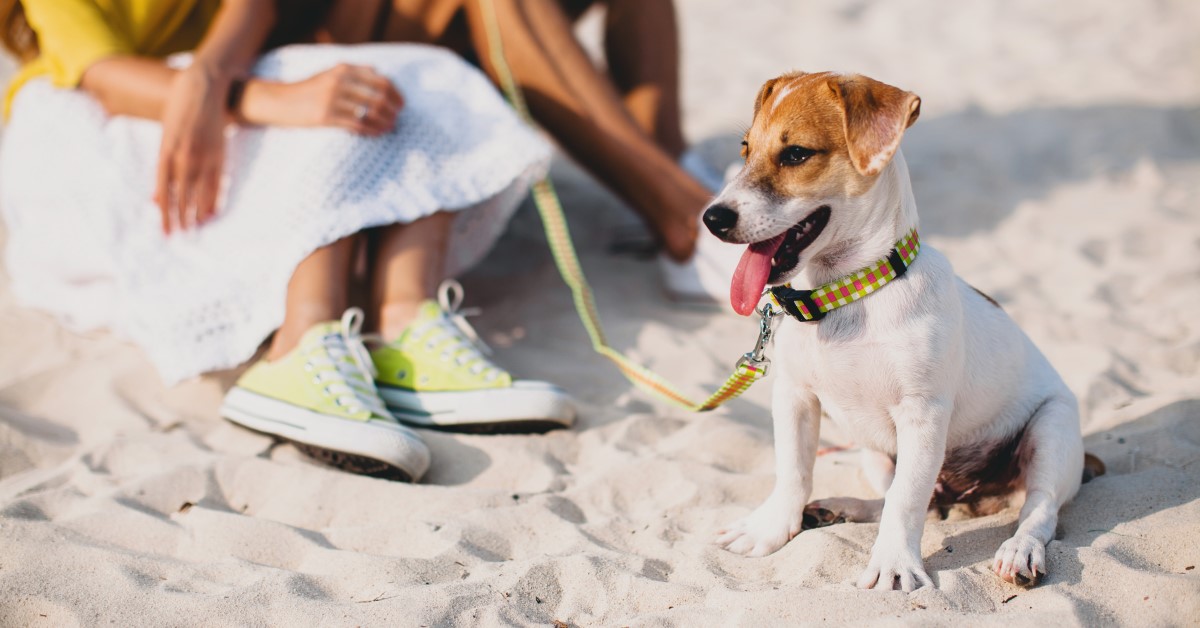Beach Safety Tips for Dog Owners
You and your dog can have a fun time at the beach as long as you follow some simple safety steps

When facing the "dog days" of summer, you might love nothing more than a refreshing trip to the beach with your dog. Dogs enjoy a change of scenery as much as their human owners -- but they can also fall prey to similar health and wellness threats from the sun, sand, and water. If you want to keep your best friend safe while still having a great time, practice the following beach safety tips for dogs.
Protect Your Dog from Sunburn & Heat Stroke
A dog at the beach can overheat quickly, especially if he is of the brachycephalic (short-nosed) variety. These kinds of dogs can't cool themselves through breathing efficiently. Don't take your French Bulldog, Pug, Boston Terrier, or English Bulldog to the beach during the hottest part of the day; instead, schedule your beach trip for early morning or evening, preferably after sundown.
Even a dog with a sizable snout can overheat under the blazing sun. Bring an umbrella or tent so your dog has a shady place to rest, along with a cooler full of bottled water for her to drink. If your dog shows signs of heat stroke, end the festivities and take your dog to the vet immediately. These symptoms include drooling, fainting, diarrhea, vomiting, and a temperature of 104 degrees Fahrenheit or above.
Don't forget that the sun's rays transmit UV radiation as well as heat. Your veterinarian can recommend a dog-friendly sunscreen that you can apply to exposed areas of your dog's skin.
Practice Sand Safety
If you've ever burned your bare feet on the beach or cut them on a submerged piece of glass, you understand how treacherous an innocent-looking sandy beach can be. Your dog's paws face the same risks, so check them frequently for injuries and keep an eye on your dog's stance and gait for possible problems. You can also purchase protective booties to keep your dog's feet clean and safe on the sand.
Curious (and hungry) dogs will sometimes try to eat sand or objects buried therein. Don't let your dog indulge in this behavior. Ingested sand can create dangerous clogs in a dog's digestive system.
Swim With Care
While some dogs seem to possess natural swimming skills and instincts, others aren't so lucky. Either way, you should play it safe by fitting your dog with a life jacket specially designed for canines. If your dog displays nervousness or hesitation around water, don't force him to go swimming with you. Even if your dog swims well, watch him carefully to make sure he doesn't tire out and get into trouble.
Remember that the ocean harbors many kinds of life, including jellyfish, stingrays, and other potentially dangerous creatures. Check frequently below the waterline so you can spot these threats and quickly move your dog out of harm's way.
Take Salt Water Seriously
Your dog might not care about the difference between ordinary drinking water and salt water. Unfortunately, salt water can cause serious dehydration and illness when used as drinking water. When you're watching over your dog at the beach, give her plenty of fresh water so she won't feel tempted to drink the seawater.
The salt in ocean water can also irritate your dog's skin, especially when combined with sand. As soon as your dog has finished a day's romp at the beach, rinse skin and fur thoroughly with fresh water and towel dry.
Pay Attention to Disease Prevention
Beach safety for dogs also means an extra focus on disease prevention. The sand, air, and seawater can contain a wide range of pests and parasites. For instance, other mammals may have left traces of leptospirosis bacteria in sandy puddles. Since this disease can cause kidney failure in infected animals, ask your veterinarian whether your dog should receive a vaccination against it before you hit the beach.
You can never know for sure what kinds of animals might roam the beach. Some may carry the deadly rabies virus, in which case they might turn aggressive and bite your dog. Before you and your pet go to the beach or any other public area, make certain that your dog is up to date on its core vaccinations, including the rabies vaccination.
Beaches can also host a variety of more mundane (but still troublesome) pests such as mites, fleas, and ticks. If your dog doesn't currently receive pest prevention medication, take that important step before your next beach visit. If your dog already receives medicated chews or another topical treatment to guard against pests, make sure to keep up that protective regimen on beach days. Be sure to include a heartworm preventative!
Have a Fun, Safe Beach Day With Your Best Friend!
As you can see, beach safety for dogs is largely a matter of conscientiousness and common sense on the part of their owners. Remember to follow the precautions and strategies noted above, and you'll find it easier to relax as you bring your dog along for many exciting beach adventures to come!
Ready to start saving money on pet wellness care?
Then take a look at Mint Wellness, the pet wellness plan that provides fast reimbursement on routine pet care. Save on vaccinations, wellness exams, preventatives, dental, and more!
Learn More


